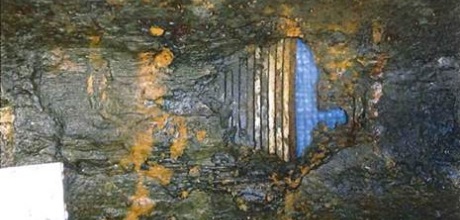Enhanced Well Chemistry and Integrity
When oil and water are produced, some undesirable effects may influence flow within the wells. This effect needs to be mitigated, and our Enhanced well chemistry and integrity programme aims to find the solutions to this.

We work towards extending the life of oil and gas wells. When oil and water are produced, some undesirable effects can adversely influence flow within the wells, by precipitating salt or mineral deposits, by causing corrosion and/or by generating hydrogen sulphide.
Our research aims to mitigate these effects. The goal is to optimize oil production by lowering operating costs and developing knowledge to support improved effectiveness of well maintenance. In this way, we extend the safe operating lifetime of materials (e.g. production tubing) and thus encourage more energy efficient recovery of oil.
Scale, corrosion, and hydrogen sulphide
The challenges of scaling, corrosion and hydrogen sulphide production are related, worsening when water is being co-produced with the oil, and have a strong influence on each other. Scale is the term for salts and minerals that deposit from produced water in the well’s pipes and valves.
Corrosion occurs when steel interacts with water, influenced by factors such as temperature and the presence of oxygen, minerals, and other chemicals in the water, and can cause problems for the structural integrity of the wells.
The generation of hydrogen sulphide in the reservoir and in the wells may exacerbate both scaling and corrosion, while also requiring additional preparedness on the platform, resulting in significant extra operational costs.
The amount of hydrogen sulphide produced in the reservoir by microbes and the degree of barium sulphate scaling are both dependent on the amount of sulphate present in formation water and injection water. Production chemicals that are used to reduce souring or to scavenge hydrogen sulphide can unintentionally worsen scaling and corrosion.
Chemical and mechanical solutions
Research at Danish Offshore Technology Centre responds to these challenges by developing both chemical and mechanical solutions that combat scale and corrosion and reduce the formation of hydrogen sulphide in more efficient and more environmentally friendly ways.
We have developed a full simulation souring prediction model, that includes souring kinetics, nitrate treatments, scale, and corrosion. With this model, it is possible to predict the maximum levels of hydrogen sulphide in a specific area of the field.
Using new solubility data for BaSO4 and FeCO3 scale, the researchers have created a new model for scale growth allowing better prediction of scale precipitation improving operational planning of well maintenance.
Production chemicals
Some of the production chemicals used in the industry to combat scale, corrosion, and hydrogen sulphide have unintended side effects, such as environmental impact and possibly a worse outcome for one of the other challenges.
In the related programme Produced Water Management much of the research deals with finding out which chemicals perform best and are most environmentally sound. We study how we can increase the effectiveness of these inhibitors and scavengers in order to reduce consumption and facilitate use of more environmentally friendly chemicals in the future.Contact
Ulla Hoffmann Programme Director Danish Offshore Technology Centre Mobile: 9351 1360 uhoff@dtu.dk